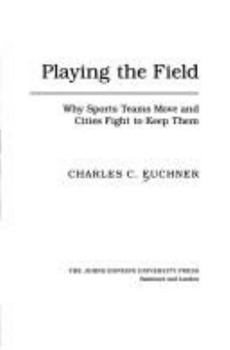Playing the Field: Why Sports Teams Move and Cities Fight to Keep Them
Select Format
Select Condition 
Book Overview
Can a sports franchise "blackmail" a city into getting what it wants--a new stadium, say, or favorable leasing terms--by threatening to relocate? In 1982, the owners of the Chicago White Sox pledged to keep the team in Chicago if the city approved a $5-million tax-exempt bond to finance construction of luxury suites at Comiskey Park. The city council approved it. A few years later, when Comiskey Park was in need of renovation, the owners threatened...
Format:Hardcover
Language:English
ISBN:0801845726
ISBN13:9780801845727
Release Date:April 1993
Publisher:Johns Hopkins University Press
Length:232 Pages
Weight:1.13 lbs.
Dimensions:0.8" x 6.3" x 9.3"
Customer Reviews
1 rating
A scholarly & comprehensive review of the subject.
Published by Thriftbooks.com User , 25 years ago
"Playing the Field" is a well-written, scholarly work (Euchner is a professor of political science) which examines, as its subtitle succinctly states, "why sports teams move and cities fight to keep them." Euchner's work seems especially relevant now, in the wake of recent moves by teams in the NFL and NHL and the mind-numbing escalation in franchise values (over $500 million dollars for the expansion Cleveland Browns). "Playing the Field" charts the reasons for the growth of this phenomena, first focusing on the political and economic interrelationship of teams and cities, and also examining the unusual nature of the pro sports "industry". The book also presents "case studies" of three cities' experience with the movement of teams: Los Angeles, Baltimore, and Chicago. Euchner, however, does not merely limit the book to observations and explanation of "why teams move and why cities fight to keep them". Euchner presents an interesting argument that cities negotiate from a re-active (rather than pro-active) approach that puts them at an inherent disadvantage; in sports parlance, they are always "playing defense". Within the case studies, he points to how the course of events may have been changed had the cities/states "played offense". This include everything from the NFL suing the Raiders for breach of contract before the Raiders filed the anti-trust suit against the NFL, the State of Maryland suing the NFL instead of suing Robert Irsay after the Colts' move, and the city of Chicago "playing hardball" with the White Sox rather than capitulating to their demands. Although the notion of "playing offense" in relocation negotiations appears to be his main answer for cities facing team relocation battles, Euchner also recommends several other solutions: congressional action, coalition building and collective agreements (treaties) between cities, and the formation of rival leagues.This book would serve as an excellent resource and enlightening reading for city planners, public officials, students of political science, history, and urban studies, and the intellectual sports fan who is interested in the business behind the game. The book, however, does beg for an update. In particular, an examination of Baltimore's failed attempt to gain an NFL expansion franchise in 1993 and subsequent luring of the Cleveland Browns would make for a an appropriate addendum, as would Los Angeles' loss of both the Rams and Raiders in 1995.






